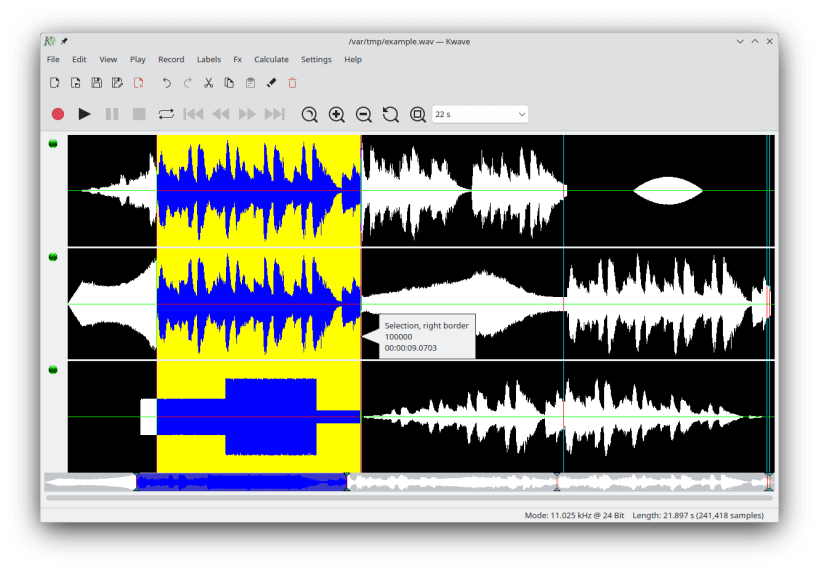

Kwave makes it simple to edit audio in many ways.
Adjust volume level:
Fade in, fade out, or custom amplitude curve Scale volume by a constant factor Normalise volume Adjust frequency content:
Lowpass filter Bandpass filter Notch filter Pitch shift Other features:
Add noise Add silence Convert audio sample rate Go to position Insert audio from clipboard Reverse audio Save audio blocks between labels as separate files Sonagram (spectrogram) Supported file formats:
WAV (.wav) Ogg/Opus (.opus) Ogg/Vorbis (.ogg) MP3 (.mp3) FLAC (.flac) ASCII coded audio (.ascii) all file formats supported by libaudiofile (some formats are import only)
You are about to open
Do you wish to proceed?
Thank you for your report. Information you provided will help us investigate further.
There was an error while sending your report. Please try again later.
Snaps are applications packaged with all their dependencies to run on all popular Linux distributions from a single build. They update automatically and roll back gracefully.
Snaps are discoverable and installable from the Snap Store, an app store with an audience of millions.

If you’re running Ubuntu 16.04 LTS (Xenial Xerus) or later, including Ubuntu 18.04 LTS (Bionic Beaver) and Ubuntu 20.04 LTS (Focal Fossa), you don’t need to do anything. Snap is already installed and ready to go.
For versions of Ubuntu between 14.04 LTS (Trusty Tahr) and 15.10 (Wily Werewolf), as well as Ubuntu flavours that don’t include snap by default, snap can be installed from the Ubuntu Software Centre by searching for snapd.
Alternatively, snapd can be installed from the command line:
sudo apt update
sudo apt install snapd
Either log out and back in again, or restart your system, to ensure snap’s paths are updated correctly.
To install kwave, simply use the following command:
sudo snap install kwave
Browse and find snaps from the convenience of your desktop using the snap store snap.

Interested to find out more about snaps? Want to publish your own application? Visit snapcraft.io now.